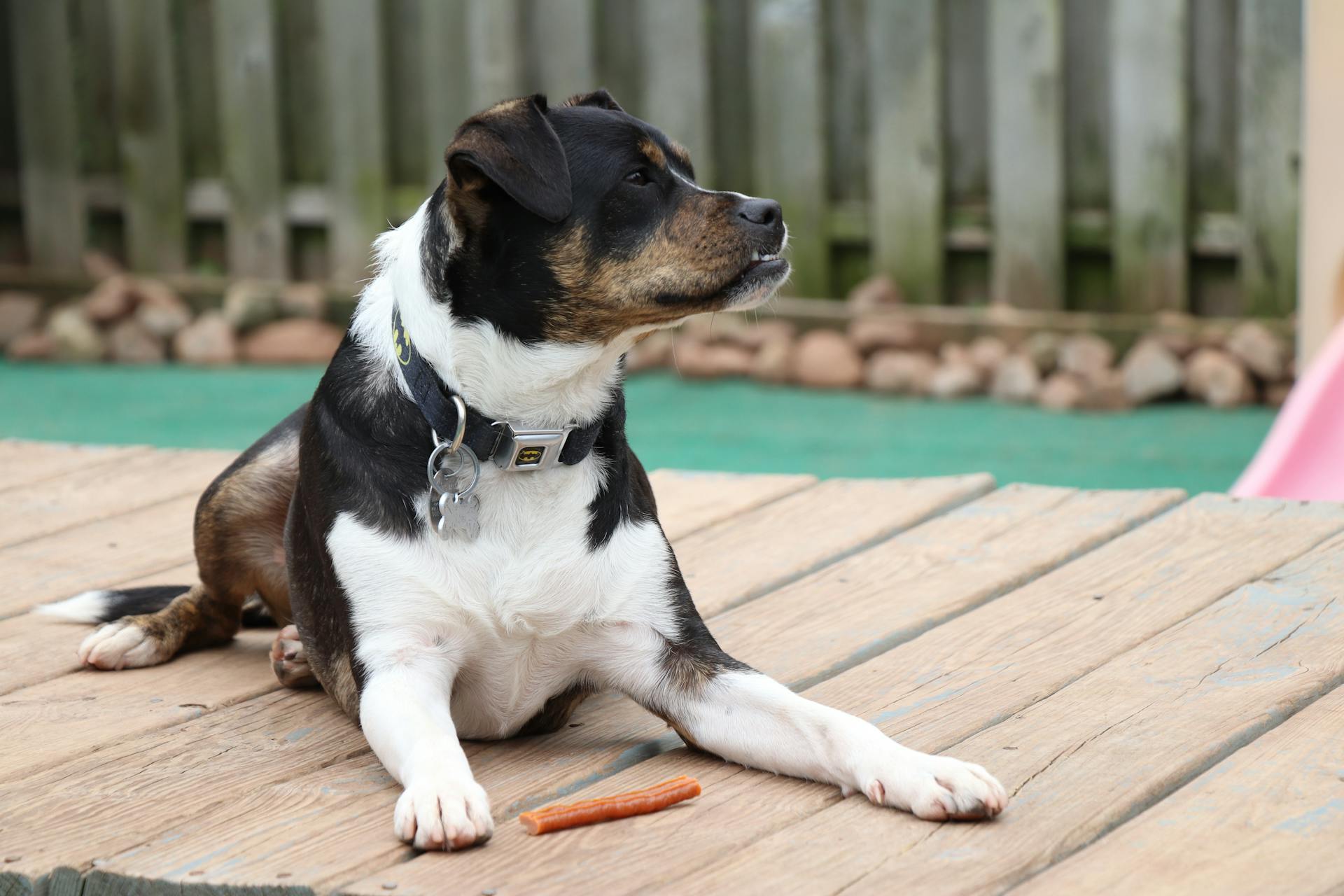
Choosing the right food for your furry friend's digestive system can be a daunting task, but with the right information, you can ensure their optimal digestive health and biome balance.
A balanced diet is essential for maintaining a healthy gut microbiome, which is responsible for 70% of the immune system. This is why a well-formulated gastrointestinal food for dogs is crucial.
Some gastrointestinal dog foods contain prebiotics, which help feed the good bacteria in the gut, promoting a balanced microbiome. These prebiotics can be in the form of fructooligosaccharides (FOS) or galactooligosaccharides (GOS).
A diet rich in fiber, such as psyllium, can also help support digestive health by promoting regular bowel movements and satiety.
Suggestion: Dog Treats for Gastrointestinal
Digestive Issues
Digestive issues in dogs can be a real challenge for pet owners. Fatty foods can be a trigger for pancreatitis in some dogs, so it's essential to switch to a highly digestible, low-fat diet.
A veterinarian may recommend a diet specifically formulated to manage gastrointestinal disorders, such as the Royal Canin Veterinary Diet Gastrointestinal Low Fat dog food. This food has a reduced fat content and easily digestible proteins to aid digestion in dogs with conditions like hyperlipidaemia or acute pancreatitis.
The key benefits of a gastrointestinal dog food include improving digestion and ensuring proper nutrient absorption through highly digestible ingredients, as seen in the Hill's Prescription Diet Dog Gastrointestinal Biome Mini. This food also contains a proprietary blend of prebiotic fibers that support beneficial gut microbiome.
Explore further: Food for Dogs with Pancreatitis
Acute vs Chronic Digestive Issues

Acute digestive issues appear suddenly and can deteriorate rapidly, while chronic issues appear intermittently or for a long period of time.
The distinction between acute and chronic digestive issues can significantly impact a dog's symptoms and management needs. In some cases, a dog's long-term nutritional needs may be affected by their digestive condition.
A gastrointestinal illness can be either acute or chronic, and this classification may influence the treatment and management required. Acute issues often require immediate attention, while chronic issues may need ongoing care and management.
If your dog is experiencing loose stool, a quick-acting solution like Hill's Prescription Diet Gastrointestinal Biome can help firm up stool within 24 hours. This product has been clinically tested to provide a rapid response to digestive issues.
A healthy digestive system is essential for overall well-being, and promoting the growth of beneficial gut bacteria can help maintain digestive health.
Discover more: Bernese Mountain Dog Health Problems
Pancreatitis
Pancreatitis can be a painful and recurring issue for dogs. Scientists have yet to identify its cause, but a fatty food diet can trigger it in some dogs.
A highly digestible, low-fat diet may be recommended by a veterinarian to help reduce the risk of recurrence.
Gastroenteritis

Gastroenteritis is a common condition that affects many dogs, causing inflammation and irritation in the digestive tract. After a dog has experienced gastroenteritis, they require a highly digestible diet to give their gastrointestinal tract time to recover.
One homemade remedy is chicken and rice, but that may not have all the nutrients your dog needs to support their recovery, and so your veterinarian may recommend a commercial diet that’s highly digestible as an alternative.
A highly digestible diet can help firm up loose stool in 24 hours, which is a key benefit of Hill's Prescription Diet Gastrointestinal Biome. This diet actively promotes regular healthy stool and helps reduce the risk of future episodes.
To introduce a new food to your pet's diet, it's essential to make a gradual transition. We recommend a transition phase of 7 days or more, as suggested by Hill's Prescription Diet.
Here are some key ingredients to look for in a highly digestible diet:
- High-quality proteins
- Easily digestible carbohydrates
- Prebiotic
- Spore-forming probiotics
- Gut-soothing herbs
- High fiber – 9.34%
These ingredients can help support the growth of beneficial gut bacteria and promote digestive health.
Nutrition and Diet
Royal Canin's Digestive Care diets are tailored to support sensitive stomachs and promote optimal stool quality. Available in wet and dry formulas for small, medium, and large dogs.
For adult dogs with gastrointestinal disorders or difficult digestion, Royal Canin Veterinary Diet Gastrointestinal Low Fat dog food is a suitable option. This food has a reduced fat content and highly digestible proteins to aid digestion.
The food also contains a low fiber content, which helps for optimal nutrient absorption and a higher digestibility. The patented antioxidant complex helps improve the immune system and the resilience of the gastrointestinal system.
Here are the key nutrients found in Royal Canin Veterinary Diet Gastrointestinal Low Fat dog food:
- Crude protein: 22%
- Crude fat: 7%
- Crude fiber: 1.7%
- Crude ash: 6.6%
To introduce new food to your pet's diet, a gradual transition is recommended, such as the 7-day transition phase suggested by Hill's Prescription.
Tailored Nutrition
Tailored nutrition is crucial for dogs with gastrointestinal issues. A change in diet is often recommended by veterinarians to help alleviate symptoms.

The type of dietary change depends on the individual dog's circumstances and medical conditions. For example, dogs with decreased appetite due to gastrointestinal health issues may benefit from a highly palatable formula.
Royal Canin's Digestive Care diets are specifically designed to support sensitive stomachs and promote optimal stool quality. These diets are available in both wet and dry formulas for small, medium, and large dogs.
A gastrointestinal disorder can be caused by various factors, including acute pancreatitis or hyperlipidaemia. In such cases, a dog's diet can be adjusted to help reduce fat content and facilitate digestion.
Some dogs may require a low-fat diet, while others may benefit from a high-fiber content. For instance, Royal Canin Veterinary Diet Gastrointestinal Low Fat dog food contains a reduced fat content and highly digestible proteins to aid digestion.
The following table summarizes the benefits of tailored nutrition for dogs with gastrointestinal issues:
A gradual transition to a new diet is essential to prevent digestive upset. It's recommended to introduce new food over a period of 7 days or more to allow your dog's digestive system to adjust.
Hill's Prescription Diet Dog Biome Mini Key Benefits
Hill's Prescription Diet Dog Biome Mini is a specially formulated food that can make a big difference in your dog's digestive health. Improves digestion and ensures proper nutrient absorption through highly digestible ingredients.
One of the key benefits of this food is its ability to firm up loose stool in just 24 hours. This can be a huge relief for dog owners who have dealt with digestive issues.
The proprietary blend of prebiotic fibers in Hill's Prescription Diet Dog Biome Mini supports beneficial gut microbiome, promoting a healthy balance of good bacteria in the gut.
Here are the key benefits of Hill's Prescription Diet Dog Biome Mini in a quick glance:
- Improves digestion and ensures proper nutrient absorption
- Firms up loose stool in 24 hours
- Supports beneficial gut microbiome
With its unique blend of ingredients, Hill's Prescription Diet Dog Biome Mini is a great option for dog owners who want to give their pets the best possible nutrition.
Rehydration and Palatability
Rehydration is key when it comes to helping your dog feel better. Rehydrate by adding ¾ cup of warm water for every cup of food, and wait 3-4 minutes before serving.
You can also use hot water to rehydrate your dog's food, like with Medicus pate powder, which requires 1 1/2 cups of hot water for every 1 cup of powder. Let it rest for 5-10 minutes before adding a bit more water and serving.
Adding a small amount of canned pumpkin to your dog's bowl can also help firm up loose stool.
Readers also liked: Does Hot Weather Affect Dogs Eating
Rehydration Recommended
Rehydration is a must when it comes to making food more palatable for your dog. Rehydrate by adding +/- ¾ cup of warm water for every cup of food, then mix and wait 3-4 minutes.
Some foods, like paté, require a bit more water. For every 1 cup of Medicus paté powder, add 1 1/2 cups of hot water (120 degrees F) and let it rest for 5-10 minutes before serving.
Adding a bit more water before serving can be beneficial, so mix in two additional tablespoons of warm water.
Discover more: Boiled Chicken Water for Dogs
Palatability Suggestions
Adding moisture and flavor to your dog's food can be as simple as mixing in some chicken bone broth. This is a great option for dogs with upset stomachs and decreased appetite because bone broth sits well in a dog's stomach.
You can also try mixing in some plain yogurt with your dog's food. This will introduce beneficial bacteria into their gut, which can help reduce the amount of harmful bacteria that causes vomiting, diarrhea, and upset stomach.
A different take: Can Dogs Have Beef Broth in Their Food
Product Information
The gastrointestinal food for dogs is designed to support the unique nutritional needs of dogs with gastrointestinal issues.
Dogs with gastrointestinal issues often require a diet rich in fiber to help regulate bowel movements.
For another approach, see: Weimaraner Dog Health Issues
Introduction and Transition
Introducing a new food to your dog's diet can be a bit tricky, but it's essential to do it gradually to prevent digestive upset. Make a transition phase of 7 days or more.
You want to ease your dog into the new food to allow their digestive system to adjust. This transition phase will help prevent stomach upset and ensure a smooth transition.
Gradually mixing the new food with their old food over a period of 7 days or more will help your dog get used to the new taste and texture.
Frequently Asked Questions
Can dogs eat gastrointestinal food long term?
Dogs with stomach conditions may need to stay on gastrointestinal food long-term, but healthy dogs can usually switch back to regular food after a short-term illness. Consult with a veterinarian to determine the best diet for your dog's specific needs.
Sources
- https://www.royalcanin.com/us/dogs/products/gastrointestinal
- https://medicusveterinarydiets.com/product/sensitive-stomach-diet-dog/
- https://www.thehungrypuppy.com/products/gastrointestinal-biome-digestive-fiber-care-dry-dog-food
- https://royalpetts.com/products/royal-canin-veterinary-diet-gastrointestinal-low-fat-dog-food
- https://shop.vivapets.com/us/hills-prescription-diet-dog-gastrointestinal-biome-mini
Featured Images: pexels.com


